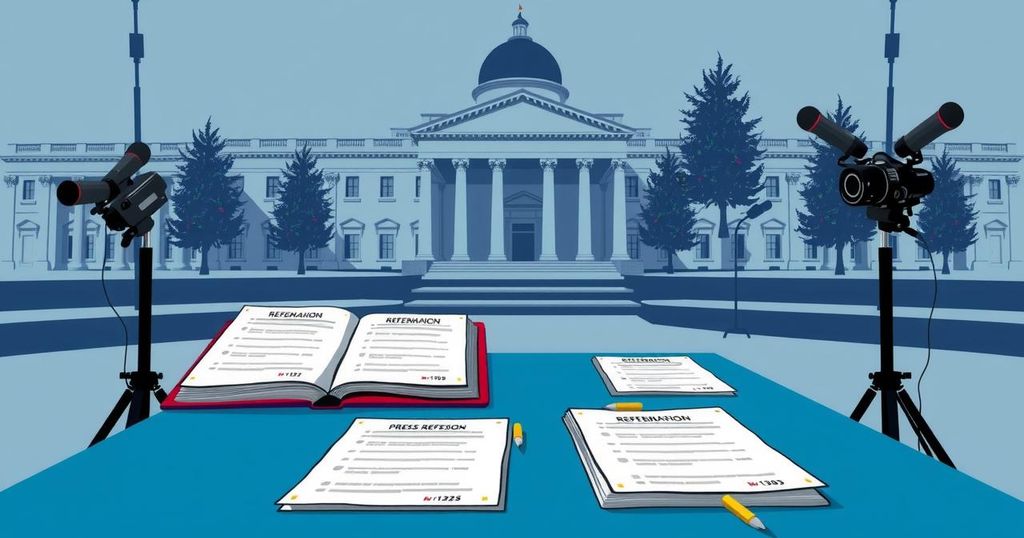Politics
ANTONIO SANGUINO, AP, ARMANDO BENEDETTI, BOGOTA, COLOMBIA, CUBA, DEMOCRACY, FERNANDO VERGARA, GOVERNANCE, JAIME ALBERTO CABAL, LATIN AMERICA, LEGISLATION, MINISTRY OF THE INTERIOR, NATIONAL ASSOCIATION OF MERCHANTS, NATIONAL SECURITY, NORTH AMERICA, SENATE, SOUTH AMERICA
Jamal Walker
0 Comments
Colombian Government Unveils Labor Reform Referendum Questions
The Colombian government has announced a proposed referendum on labor reform aimed at improving worker rights, yet faces substantial opposition from businesses. Key questions include health insurance provisions, overtime pay, and special hiring quotas for disabled workers. Critics suggest these measures may hinder job creation, while the government’s ability to secure enough public support and navigate legislative hurdles remains in question.
In an effort to engage the public on labor law reforms, the Colombian government has unveiled 12 questions that will form the basis of a proposed referendum. This initiative, announced during a press conference on April 22, 2025, by Interior Minister Armando Benedetti and Labor Minister Antonio Sanguino, aims to provide employees with increased access to health benefits and overtime pay. However, critics warn that such reforms could complicate job creation in Colombia, the fourth largest economy in Latin America.
As the Ministry of the Interior disclosed the specifics of the referendum, it became clear that a date for voting has yet to be determined as the proposal still requires Senate approval. Among the questions posed to citizens are whether food delivery platforms should be mandated to furnish health insurance for their freelance workers and if companies ought to pay double rates for work performed on Sundays. Another significant query is about extending daytime work hours to 6 a.m. to 6 p.m., with implications for additional compensation for early or late shifts.
Moreover, the government has suggested that businesses pay a 35% bonus for hours worked outside of the standard daytime schedule. Business associations have sharply criticized these reforms, cautioning that they could strain small and medium-sized enterprises, prompting them to bypass formal labor contracts in favor of informal arrangements that involve cash payments. “The government’s reforms do not recognize the reality of 16 million informal laborers and unemployed people in Colombia,” said Jaime Alberto Cabal, president of the National Association of Merchants, in a video on social media.
Additionally, the referendum will explore whether to establish a special fund aimed at providing pensions for rural workers and if companies should be required to hire at least two individuals with disabilities for every 100 employees. President Gustavo Petro is galvanizing support for the referendum, planning a march to Congress on May 1 to advocate vocally for the legislative approval.
In a televised address, Petro expressed his determination for the public to have a say in these crucial reforms, framing Congress as unresponsive to the will of the people. This push for a referendum comes as the president has struggled to advance significant labor law and healthcare legislation through the Senate, which are key components of his economic strategy. Some political observers suggest he is employing the referendum as a strategy to sidestep the legislative gridlock.
However, analysts indicate that securing enough voter support could be challenging for Petro. Colombian law mandates that at least one-third of eligible voters must participate in a popular consultation for its outcomes to be legally binding, meaning around 13 million votes are needed. Comparatively, Petro garnered 11 million votes during his 2022 presidential election victory.
Yan Basset, a political analyst at Rosario University, highlighted that while labor unions may strongly support the referendum, their ability to mobilize a significant voter turnout could be limited. He also noted that the referendum provides an opportunity for Petro to rally his party’s base ahead of the next presidential election, although failing to pass it could seriously undermine the perception that he represents the people’s interests.
The Colombian government’s proposed referendum on labor reforms is a significant move aimed at enhancing worker rights and benefits, poised to generate considerable discussion and potential voter engagement. However, with skepticism from business groups and the challenge of achieving sufficient public support, the success of this initiative remains uncertain. As President Gustavo Petro seeks to circumvent legislative hurdles, analysts are watching closely to see how this political strategy unfolds ahead of the upcoming elections.
Original Source: apnews.com




Post Comment